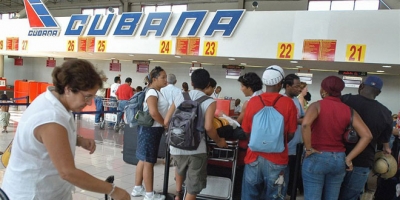
Cubans traveling abroad in record numbers, officials say
By Nelson Acosta
HAVANA (Reuters) – Cubans are taking advantage of the loosening of travel restrictions this year to go abroad in record numbers, the government said on Monday, with the tally of travelers rising by 35 percent since a new law took effect in January.
The United States, Mexico and Spain were the most visited destinations by Cubans, according to Colonel Lamberto Fraga Hernandez, deputy director of immigration.
The new law got rid of Cuba’s much-hated need to obtain an exit visa and loosened other restrictions that had discouraged Cubans from leaving. Fraga said that 226,877 Cubans had traveled abroad since the law went into effect on Jan. 14, compared to 167,684 during the same period in 2012 and far more than traveled in previous years.
Cubans can now travel abroad for up to two years without returning home to renew their passports. Fraga said 58 percent had already returned and 24,000 had traveled more than once this year.
“The new migration measures have had a positive impact. … Cubans are not fleeing, they are traveling normally,” he told a Havana news conference.
“Today, obtaining visas is the main obstacle that limits Cubans’ travel,” Fraga said.
Cuba reported earlier this year that a record 46,000 residents had permanently left the Caribbean island in 2012, and the United States has reported an upsurge in the number of Cubans crossing into the country from Mexico, taking advantage of a special law that automatically welcomes them.
Cuba’s old travel law was enacted in 1961 to slow the flight of Cubans after the island’s 1959 revolution by severely restricting their movements, similar to a ban still in place in the United States on most citizens’ travel to Cuba.
Many dissidents have taken advantage of the new freedom to travel outside Cuba, coming and going as they please, unlike in other communist nations.
The new travel law is one of the wide-ranging reforms President Raul Castro has enacted since he succeeded his older brother, Fidel Castro, in 2008. There are still restrictions on travel, mainly for reasons of national security and for those with pending legal cases.
Americans are also visiting Cuba in higher numbers despite strict travel restrictions, joining the hundreds of thousands of Cuban Americans who travel home each year, according to Cuban government figures published earlier this month.
Just over 98,000 U.S. citizens visited Cuba in 2012, up from 73,500 in 2011 and twice the number compared to five years ago, according to the National Statistics Office.
The numbers do not include more than 350,000 Cuban Americans estimated by travel agents and U.S. diplomats to have visited the island last year. Because Cuba considers them nationals, they are not listed in its tourism statistics.
(From Reuters)


